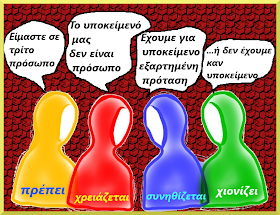Language/Modern-greek-1453/Vocabulary/Common-Impersonal-Verbs
In this lesson, we will explore the fascinating world of common impersonal verbs in Modern-greek-1453! 🌟 These verbs are used in the third singular person and do not have a noun or pronoun as their subject. After mastering this lesson, you might also be interested in expanding your vocabulary with other related topics, such as Modern-greek-1453 Vocabulary - Time Seasons Days Months ⏰ and Food and drink 🍽️. Enjoy your journey into the captivating realm of Modern-greek-1453 impersonal verbs!
Phrases using Impersonal Verbs in Modern Greek[edit | edit source]
| Greek | English |
|---|---|
| χρειάζεται
Δε χρειάζεται να έρθεις και εσύ μαζί μας αύριο |
need to do
There is no need for you to come with us tomorrow. |
| μπορεί
Μπορεί να φύγουμε νωρίς |
might
We might leave early |
| φαίνεται
Φαίνεται ότι υπήρχε κάποιο πρόβλημα |
it seems
It seems that there was a problem |
| ενδέχεται
Ενδέχεται να έρθουν και αυτοί στην Ελλάδα το καλοκαίρι |
it is likely, it is possible
They are likely to come to Greece this summer as well |
| αξίζει
1) Αξίζει να προσπαθήσεις περισσότερο 2) Της αξίζει να κερδίσει |
1) it is worth
It is worth to try more (literally) 2) to deserve She deserves to win |
| φτάνει
Μπορείς να φορέσεις το φόρεμά μου, φτάνει να μην το λερώσεις |
as long as
You can wear my dress as long as you don’t stain it |
| αρκεί
Θα πάμε όπου θέλουμε, αρκεί να μη βρέχει |
as long as
We will go wherever we like, as long as it doesn’t rain |
| επιτρέπεται
Δεν επιτρέπεται να φάτε, αλλά μπορείτε να έχετε νερό μαζί σας |
it is allowed
You are not allowed to eat but you can have water with you |
| απαγορεύεται
Απαγορεύεται το κάπνισμα |
is forbidden
Smoking is forbidden |
| βρέχει
Σήμερα βρέχει όλη τη μέρα |
it rains
Today it’s been raining the whole day |
| ψιχαλίζει
Πάρε ομπρέλα γιατί ψιχαλίζει |
it’s drizzling
Take an umbrella because it’s drizzling |
| φυσάει
Τον Αύγουστο πάντα φυσάει |
it is windy
In August it is always windy |
| χιονίζει
Χθες χιόνισε και τα σχολεία ήταν κλειστά |
it snows
it snowed and the schools were closed |
Greek Impresonal Verbs and the verb "to be"[edit | edit source]
| Greek | English |
|---|---|
| είναι καλό
Είναι καλό να πας στη συνάντηση |
it is good
It is good (for you) to go to the meeting |
| είναι κακό
Είναι κακό να λες όλα αυτά τα πράγματα για τη φίλη σου |
it is bad
is bad to say all these things for your friend |
| είναι σίγουρο / βέβαιο
Είναι σίγουρο πως θα έρθει; |
it is certain
Is it certain that she is coming? |
| είναι ώρα
Είναι ώρα να πηγαίνουμε |
it is time
It is time to go |
| είναι κρίμα
Είναι κρίμα που δεν ήρθες! |
it is a pity
It is a pity that you didn’t come |
| είναι ντροπή
Είναι ντροπή να μιλάνε άσχημα για τη μητέρα τους. |
it is a shame
It is a shame to talk bad about their mother |
See also the lesson on impersonal verbs : Language/Modern-greek-1453/Grammar/Impersonal-Verbs[edit | edit source]
Videos[edit | edit source]
Greek Grammar Lesson - How to use different Impersonal verbs[edit | edit source]
Learn Greek online: How you can use the verb "πρόκειται"[edit | edit source]
Author[edit source]
- Ευγενική χορηγία που στοχεύει να βοηθήσει μαθητές ή μη, απανταχού της Γης, που επιδίδονται στην εκμάθηση της ελληνικής γλώσσας!
- Contribution bénévole visant à aider les personnes, partout dans le monde, qui sont engagées dans l'apprentissage de la langue grecque !
- Voluntary contribution aimed at helping people, all over the world, who are committed to learning the Greek language!
Other Lessons[edit | edit source]
- Seasons
- City
- Education
- Count to 10
- Ask a question
- Countries of South America and Capitals
- Most common adjective in Greek
- Happy New Year
- Geography

